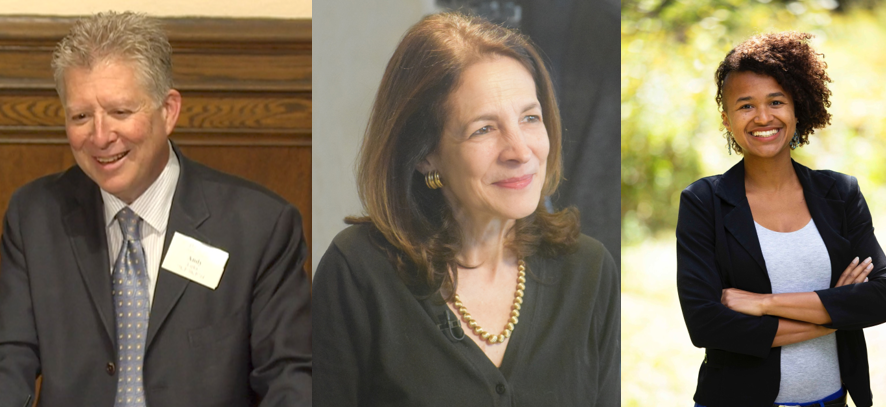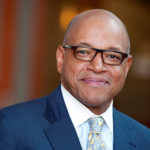Three petition candidates announce bid for Yale Corporation seat
Three candidates — Andrew Lipka ’78, Gail Lavielle GRD ’81 and Zoraya Hightower ENV ’16 — will run for the alumni fellow position in the 2022 election.

The three petition candidates for the 2022 Yale Corporation alumni fellow election: Andrew Lipka ’78, Gail Lavielle GRD ’81 and Zoraya Hightower ENV ’16. Courtesy of Lipka, Lavielle and Hightower.
Editor’s note: Since the publication of this article, the Yale Corporation announced that petition candidacies are not permitted in elections from 2022 onward. As such, these three candidates will not be allowed to run as petition candidates in the 2022 election.
Three Yale alumni will vie for a spot on the Yale Corporation in the 2022 election, marking the largest number of petition candidates in recent memory.
The three candidates are Andrew Lipka ’78, Gail Lavielle GRD ’81 and Zoraya Hightower ENV ’16. Between May 24 and Oct. 1, they each must collect 4,464 signatures from Yale alumni to qualify for a spot on the 2022 ballot for the Yale Corporation. The candidates’ platforms cover issues ranging from divesting from fossil fuels to preserving shopping period, but coalesce around reforming the Corporation election process.
“Yale seems determined not to publicize the voting or the process which contributes to low voter participation,” said Victor Ashe ’67, a petition candidate for the 2021 election. “Last year less than 13 percent of all graduates voted. This year it may increase to 18 percent, which is an improvement but still far below what it should be. Yale does not make it easy to participate in this election process, I regret to say.”
Ashe and Maggie Thomas’ ENV ’15 ran and qualified as petition candidates for the 2021 election. Thomas had to drop out of the race after accepting the chief of staff role in the White House Office of Domestic Climate Policy. Voting has now closed for the 2021 edition and ballot counting is underway.
Though Ashe and Thomas qualified as petition candidates for the 2021 election, the process is scarcely used, and current and past candidates have criticized it as arcane and restrictive to entry. Most alumni fellows are nominated by a group of alumni representatives and administrators called the Alumni Fellow Nominating Committee. The Committee’s candidates are encouraged not to share their views on any issues the University faces.
The election process is laid out in the University’s Miscellaneous Regulations, and stipulates that all alumni who graduated more than five years ago can vote. After declaring their candidacy more than a year in advance of the election, petition candidates must collect signatures from three percent of the alumni body that received ballots to vote in the 2021 election. Once that threshold is reached, they can run against the Nominating Committee-chosen candidates in the 2022 general election.
Hightower is running in the 2022 election as a representative of Yale Forward, an organization that backs climate-conscious candidates in the Corporation elections. In the 2021 election, the organization sponsored Thomas’ candidacy.
Hightower will focus on many of the same issues as Thomas, including divesting from the fossil fuel industry, reducing Yale’s carbon emissions and increasing transparency around the Corporation’s activities. She has called on Yale to publish Corporation meeting minutes — which are generally kept private — make Trustees accessible and to run a transparent election. But Hightower will bring a “slightly different lens” than Thomas did, she said, specifically, focusing on racial and social justice and creating an inclusive environment at Yale.
Lavielle also zeroed in on issues of transparency within the Yale Corporation. Her platform includes repealing the 50-year embargo on Corporation meeting minutes and reducing the petition signature threshold to around 250 signatures, instead of the current 4,464.
“I’ve noticed that the more I talk with Yale alumni, the more concerns I hear about Yale’s future,” Lavielle told the News. “The quality of Yale’s graduates is arguably the university’s greatest accomplishment. Our alumni could and should be one of its most important resources. But alumni cannot contribute their viewpoints or cast informed votes unless they have access to information. I want to ensure them a pathway to greater engagement in the exchange of ideas about Yale’s present and future.”
Yale’s greatest challenge in the coming years will be maintaining its preeminence in a changing society, Lavielle said. She specifically pointed to questions about strengthening the sciences at Yale without sacrificing the humanities, the growing size of the administration, Yale’s impact on the environment, admissions criteria and standardized testing, and whether Yale should “follow societal trends or take the lead in determining what values and perspectives to impart to its students,” Lavielle told the News.
The University should regularly survey alumni on important issues and take their input into account, she said.
Lipka also called for greater alumni engagement, particularly around Yale’s educational mission. In 2011, Lipka participated in the Yale for Life program, in which alumni live on campus for one to two weeks and take courses with top faculty. Two years later, when the University nearly canceled the program, Lipka took over running it.
But in 2019, the program was terminated. Immediately after, Lipka started up EverScholar, a nonprofit in which University professors offer seminars to people who wish to continue their education in a less formal setting. He approached University President Peter Salovey about setting up an ongoing education program for alumni, but Salovey did not accept the idea.
Lipka said that the educational programs are mutually beneficial, connecting alumni to faculty and in turn making them more generous and engaged with the University. His platform centers on engaging alumni with Yale.
“I’m proud of the fact that every day now, my life is enhanced by my relationship with Yale,” Lipka said. “But it’s like pulling teeth to make that happen.”
Like Lavielle, he said that alumni should be consulted on issues Yale might face in the coming years. Lipka specifically noted the growing number of students choosing to live off campus instead of in their residential college, the elimination of shopping period and what he described as a slow faculty hiring pace during the pandemic.
Professors and alumni must play a greater role in the stewardship of Yale, Lipka said. Currently, administrators, who often turn over quickly, control the major decisions on campus.
“The University is a feudal institution,” Lipka said. “It’s meant to be like a battleship and turn slowly. That doesn’t mean that it shouldn’t respond to the concerns of the day, but it has to do so in the context of the concerns of eternity.”
Since graduating from Yale, Lipka has worked as an ophthalmologist and volunteered at the University, interviewing for the admissions office and serving as President of the Yale Club of Princeton. Two of his children attended Yale College.
If he were on the Corporation, Lipka said he would meet with students every time he came to campus.
Hightower also said she hoped to speak with members of the Yale community, including students, faculty and staff. Hightower previously worked on environmental projects in East Africa and Southeast Asia for an international development and consulting firm. She left the firm last week to become executive director of the nonprofit Peace and Justice Center. Additionally, Hightower serves as a city councilor in Burlington, Vermont.
Working in local politics helped her understand what it means to listen to and advocate for a community by enacting tangible policies, she said. Additionally, Hightower said it is important for the Corporation to have the perspective of a young woman of color.
At Yale, she became fascinated by cities as sites to change the way resources are used. When she arrived in Burlington, Hightower was on the development review board. But she found herself enforcing policies that she disagreed with. She then ran for city councilor as a way to change those policies, and sponsored a bill to defund the Burlington police by 30 percent.
Lavielle also had a career in government, serving in the Connecticut House of Representatives for a decade. There, she advocated for education equity and environmental protection, as well as workforce development and streamlining the government. Lavielle is also a former classical music critic, former senior Vice President of corporate affairs for Suez Environment —the world’s largest water and wastewater company — and fluent in French and English. She lives in Wilton, Connecticut.
It was Yale that gave her the skills for her winding career path, Lavielle said. Specifically, Yale provided her with “an inquiring and rigorous thought process, an openness to different perspectives, and a keen understanding of the value of listening and clear communication,” she explained.
The 2022 Alumni Fellow election will take place next spring.








